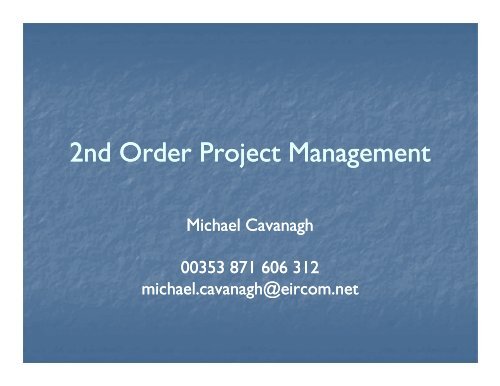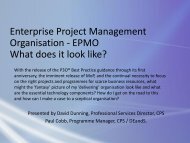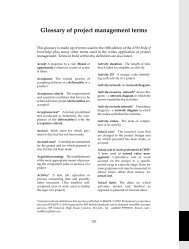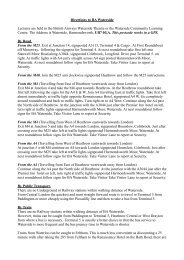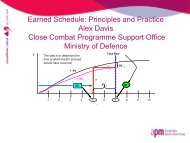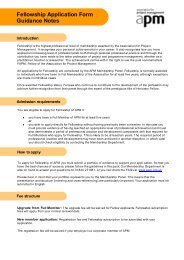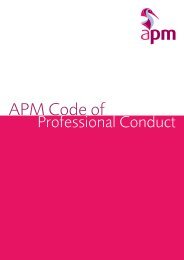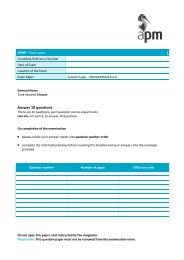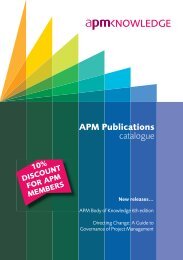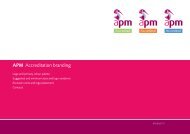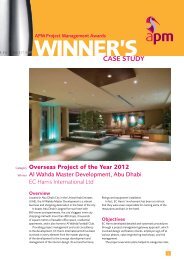Michael Cavanagh - 2nd order project management.pdf
Michael Cavanagh - 2nd order project management.pdf
Michael Cavanagh - 2nd order project management.pdf
Create successful ePaper yourself
Turn your PDF publications into a flip-book with our unique Google optimized e-Paper software.
<strong>2nd</strong> Order Project Management<br />
<strong>Michael</strong> <strong>Cavanagh</strong><br />
00353 871 606 312<br />
michael.cavanagh@eircom.net
Project Failures Product<br />
Successes!<br />
©<strong>Michael</strong> <strong>Cavanagh</strong> 2010 2
Complicated vs. Complex<br />
Complicated – when you know what you have to do<br />
Complex – when you don’t<br />
©<strong>Michael</strong> <strong>Cavanagh</strong> 2010 3
Complex Projects<br />
..are characterised by uncertainty, non-<br />
linearity and recursiveness, best viewed as<br />
dynamic and evolving systems. (ICCPM)<br />
So why do we pretend they are predictable,<br />
definable and fixed – and why do we use<br />
linear lifecycle models to manage them???<br />
©<strong>Michael</strong> <strong>Cavanagh</strong> 2010 4
If you do what you’ve always done,<br />
you’ll get what you always get<br />
“Insanity is doing the same<br />
thing over and over again<br />
and expecting different<br />
results.”<br />
Albert Einstein<br />
©<strong>Michael</strong> <strong>Cavanagh</strong> 2010 5
Conspiracy of Optimism<br />
Political expediency,<br />
combined with<br />
Commercial and Competitive pressure,<br />
plus<br />
Short-term-based personal incentive<br />
…Conspiracy for Approvals?<br />
©<strong>Michael</strong> <strong>Cavanagh</strong> 2010 6
When shall we three meet again?<br />
In thunder, lightning, or in rain?<br />
Purchaser<br />
©<strong>Michael</strong> <strong>Cavanagh</strong> 2010 7
st Od Order PM<br />
1 st<br />
PMBoK<br />
EVM<br />
PRINCE 2<br />
LCM<br />
CMM-I<br />
Etc…<br />
Etc…<br />
©<strong>Michael</strong> <strong>Cavanagh</strong> 2010 8
nd Od Order PL<br />
2 nd<br />
Complexity Assessment<br />
Adhocratic Leadership<br />
Appropriate Contracting Models<br />
Outcome Management<br />
System Thinking<br />
Requisite Variety<br />
Experiential Learning<br />
©<strong>Michael</strong> <strong>Cavanagh</strong> 2010 9
Project Complexity Assessment<br />
Competence Drivers<br />
Experience<br />
Leadership<br />
Creativity<br />
Flexibility<br />
Complexity Drivers<br />
Intricacy<br />
Size (Cost & schedule)<br />
Recursiveness<br />
Uncertainty/ instability<br />
Geographical spread<br />
Technological l<br />
innovation<br />
©<strong>Michael</strong> <strong>Cavanagh</strong> 2010 10
Complexity Assessment Matrix<br />
Low<br />
High<br />
High 1 st Order PM 1 st and 2 nd<br />
Order PM<br />
Existing<br />
Competence<br />
Low<br />
Buy in<br />
Subcontract<br />
or Exit<br />
Programme Complexity
Leadership<br />
- Bureaucratic vs. Adhocratic<br />
Bureaucracy – when you know what to expect<br />
Process<br />
Structure<br />
Authority<br />
Adhocracy – when you don’t<br />
Autopoiesis<br />
Adaptability<br />
Innovation<br />
Creativity<br />
©<strong>Michael</strong> <strong>Cavanagh</strong> 2010 12
Leadership<br />
Having the courage to make clear decisions<br />
without apology<br />
©<strong>Michael</strong> <strong>Cavanagh</strong> 2010 13
The Personal cost of Process<br />
Improvement<br />
Cost<br />
Benefit<br />
The long, dark night of the soul<br />
Time<br />
©<strong>Michael</strong> <strong>Cavanagh</strong> 2010 14
Appropriate Contracting<br />
ti<br />
x4<br />
Cost<br />
Estimation<br />
accuracy<br />
x2<br />
Levels of uncertainty<br />
x1.5<br />
x1.25<br />
Initial ConOp Requirements Detailed Product<br />
proposal spec design acceptance<br />
Lifecycle stage<br />
Source: Barry Boehm, Software Engineering Economics<br />
©<strong>Michael</strong> <strong>Cavanagh</strong> 2010 15
‘Left Shift’<br />
%tage of<br />
errors<br />
originating<br />
g<br />
at phase<br />
%tage of<br />
errors<br />
detected<br />
at phase<br />
Cost<br />
To Repair<br />
Initial ConOp Requirements Detailed Product Operation Disposal<br />
proposal spec design acceptance<br />
Lifecycle stage<br />
Source: Barry Boehm, Software Engineering Economics<br />
©<strong>Michael</strong> <strong>Cavanagh</strong> 2010 16
Outcome Management<br />
Winning the war, not<br />
the battle<br />
©<strong>Michael</strong> <strong>Cavanagh</strong> 2010 17
Outcome Management<br />
1 st Order PM provides deliverables only<br />
Tends to satisfy want rather than need<br />
OM starts with a mutually agreed purpose<br />
What is this a system to do?<br />
Vision – a statement of a future reality in which<br />
the purpose is achieved<br />
©<strong>Michael</strong> <strong>Cavanagh</strong> 2010 18
Visions<br />
i<br />
Carthago Delenda est!<br />
"Free at last! free at last!<br />
thank God Almighty,<br />
we are free at last!"<br />
We are the Champions!<br />
©<strong>Michael</strong> <strong>Cavanagh</strong> 2010 19
System Thinking<br />
No man is an island, entire of itself…<br />
©<strong>Michael</strong> <strong>Cavanagh</strong> 2010 20
Mess<br />
©<strong>Michael</strong> <strong>Cavanagh</strong> 2010 21
Soft Systems Methodology<br />
Rich Pictures<br />
(SSM)<br />
CATWOE Analysis<br />
Root Definitions<br />
Conceptual Models<br />
Relevant Systems<br />
©<strong>Michael</strong> <strong>Cavanagh</strong> 2010 22
The Viable System Model<br />
©<strong>Michael</strong> <strong>Cavanagh</strong> 2010 23
Systemic enquiry in the real world<br />
Soft Systems<br />
Methodology<br />
(SSM)<br />
Viable Systems Model<br />
(VSM)<br />
System Anatomy<br />
IDEF<br />
©<strong>Michael</strong> <strong>Cavanagh</strong> 2010 24
The… System Anatomy<br />
Constraints<br />
What are the<br />
boundaries within<br />
which we must<br />
operate?<br />
Risks<br />
What could prevent us from<br />
achieving our purpose?<br />
Materiel<br />
What inputs<br />
(tangible– e.g.<br />
supplies<br />
or intangible - e.g.<br />
information) do we<br />
need in <strong>order</strong> to<br />
perform these<br />
activities?<br />
Activities<br />
What tasks do we have to perform to<br />
achieve the desired purpose?<br />
Expressed as active verbs<br />
(If possible, showing the relationships<br />
and interdependencies between tasks)<br />
Purpose<br />
(by stakeholder)<br />
What is this a system<br />
to do?<br />
What does it deliver?<br />
How will success<br />
be measured?<br />
Resource (Quantitative)<br />
How many/ How much?<br />
Capability (Qualitative)<br />
What tools/knowledge/skills/processes<br />
do we need?<br />
©<strong>Michael</strong> <strong>Cavanagh</strong> 2010 25
System Anatomy<br />
Recursion<br />
Supersystem<br />
Activities<br />
Constraints<br />
Risks<br />
System<br />
Materiel<br />
Resource<br />
Activities<br />
Purpose<br />
Capability<br />
Constraints<br />
Risks<br />
Constraints<br />
Risks<br />
Constraints<br />
Risks<br />
Subsystems<br />
Materiel<br />
Activities<br />
Purpose<br />
Materiel<br />
Activities<br />
Purpose<br />
Materiel<br />
Activities<br />
Purpose<br />
Resource<br />
Resource<br />
Resource<br />
Capability<br />
Capability<br />
Capability<br />
Sub-Subsystems<br />
Constraints<br />
Risks<br />
Constraints<br />
Risks<br />
Constraints<br />
Risks<br />
Materiel<br />
Materiel<br />
Materiel<br />
Activities Purpose<br />
Activities Purpose<br />
Activities<br />
Purpose<br />
Resource<br />
Resource<br />
Resource<br />
Capability Capability Capability<br />
©<strong>Michael</strong> <strong>Cavanagh</strong> 2010 26
Variety<br />
…the measure of the number of different<br />
possible states of a system<br />
©<strong>Michael</strong> <strong>Cavanagh</strong> 2010 27
Requisite it Variety<br />
Requisite variety – Control can only be obtained if<br />
the variety of the controller is at least as great<br />
as the variety of the system to be controlled<br />
… you need more answers than there are<br />
questions…<br />
©<strong>Michael</strong> <strong>Cavanagh</strong> 2010 28
Requisite it variety<br />
Flexibility wins.<br />
©<strong>Michael</strong> <strong>Cavanagh</strong> 2010 29
RV in Complex Projects<br />
Complexity Amplifiers<br />
(Complexity Drivers)<br />
Complexity Attenuators<br />
(Variety Amplifiers)<br />
©<strong>Michael</strong> <strong>Cavanagh</strong> 2010 30
Complexity Amplifiers<br />
Unpredictability (novelty)<br />
Intricacy<br />
Requirements uncertainty<br />
Organisational structure<br />
Regulation<br />
Project Size/ Duration<br />
Distance – geographical/ cultural<br />
Lack of (ignorance of) environment/ constraints<br />
Inappropriate PM paradigm<br />
©<strong>Michael</strong> <strong>Cavanagh</strong> 2010 31
“The lethal (Complexity Amplifier) is sheer<br />
ignorance”<br />
Stafford Beer<br />
…but the opposite of ignorance is ‘knowledge’<br />
©<strong>Michael</strong> <strong>Cavanagh</strong> 2010 32
Complexity Attenuators t - Repertoire<br />
Appreciation - what we ‘see’<br />
Capability – what we ‘can’ do<br />
Judgement – what we ‘should’ do<br />
©<strong>Michael</strong> <strong>Cavanagh</strong> 2010 33
Building repertoire<br />
Adaptive learning – coping with situations that<br />
have known solutions – builds Capability<br />
Generative learning - the active process of<br />
saying “Oh, that’s like…” ...the process of<br />
constructing links between new and old<br />
knowledge – builds Appreciation<br />
©<strong>Michael</strong> <strong>Cavanagh</strong> 2010 34
Improvisation<br />
Intuition Insight<br />
Inspiration<br />
Cognitive Repertoire<br />
Luck<br />
Reflection<br />
Practice<br />
Wisdom<br />
Knowledge<br />
Tacit<br />
Explicit<br />
Craft<br />
Skill<br />
Order<br />
Information<br />
Data<br />
©<strong>Michael</strong> <strong>Cavanagh</strong> 2010 35
Education vs. Training<br />
Education<br />
Improvised<br />
Informal<br />
No rules<br />
Why?<br />
Unarticulatable<br />
Wisdom<br />
Knowledge<br />
Scripted<br />
Articulatable<br />
Rules<br />
Skills How?<br />
Formal<br />
Training<br />
Information<br />
Data<br />
©<strong>Michael</strong> <strong>Cavanagh</strong> 2010 36
Experiential Learning<br />
Learning is a system to…<br />
… transfer the existing body of knowledge and<br />
experience across generational and<br />
geographical boundaries<br />
… in <strong>order</strong> to enable learners to extend their<br />
repertoire to its limit<br />
… with ih a view to maximising ii their contribution<br />
i<br />
to the world by acting wisely and ethically<br />
©<strong>Michael</strong> <strong>Cavanagh</strong> 2010 37
Myself<br />
Learning from …<br />
What did I do? What happened?<br />
What am I doing? What is happening?<br />
What should I do next? What might happen?<br />
Other people<br />
Other people’s wisdom is only a source of my<br />
own learning, it is not learning itself.<br />
©<strong>Michael</strong> <strong>Cavanagh</strong> 2010 38
Learning from<br />
LfE or LiE?<br />
Reflecting on what happened<br />
Post-event<br />
Learning in<br />
Knowing what’s happening while it’s<br />
happening<br />
Reflective practice<br />
©<strong>Michael</strong> <strong>Cavanagh</strong> 2010 39
Learning Visions<br />
i<br />
We will never<br />
make the same<br />
mistake twice<br />
©<strong>Michael</strong> <strong>Cavanagh</strong> 2010 40
Learning Visions<br />
We will<br />
repeat recreate<br />
successes<br />
©<strong>Michael</strong> <strong>Cavanagh</strong> 2010 41
Learning Visions<br />
i<br />
We will<br />
remember how to<br />
do things<br />
©<strong>Michael</strong> <strong>Cavanagh</strong> 2010 42
Learning Visions<br />
i<br />
We will know<br />
what ht to do next<br />
©<strong>Michael</strong> <strong>Cavanagh</strong> 2010 43
Learning visions<br />
i<br />
We will be<br />
prepared for the<br />
unexpected<br />
©<strong>Michael</strong> <strong>Cavanagh</strong> 2010 44
Learning in the lifecycle<br />
Enquiry<br />
Execution<br />
Reflection and<br />
Analysis<br />
Complete Project Lifecycle<br />
and/or<br />
Each Lifecycle Phase
Learning in the lifecycle<br />
Similarity<br />
Search<br />
History Libraries<br />
LfE<br />
Simulation<br />
Reflection-in-action<br />
Scenarios<br />
LiE<br />
Project diaries<br />
i<br />
History production<br />
LfE<br />
Complete Project Lifecycle<br />
and/or<br />
Each Lifecycle Phase<br />
Reflection–on-action<br />
Stories<br />
CoP<br />
Personal learning<br />
Personal Reflection
Overcoming Organisational<br />
‘Culture’<br />
You’re paid to<br />
work, not to<br />
think<br />
©<strong>Michael</strong> <strong>Cavanagh</strong> 2010 47
<strong>2nd</strong> Order PM<br />
Flexibility wins.<br />
©<strong>Michael</strong> <strong>Cavanagh</strong> 2010 48


